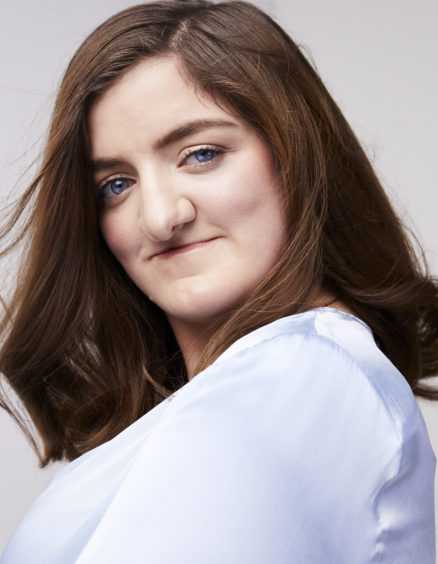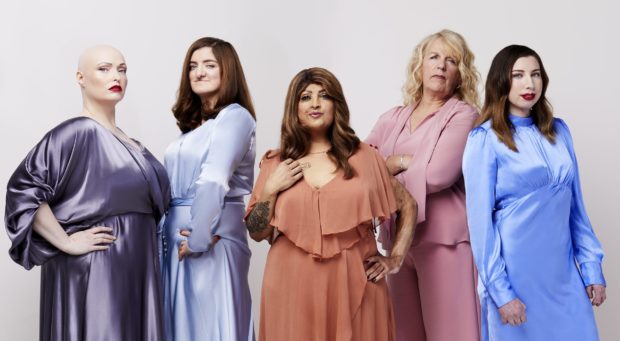With her lilac satin dress and piercing blue eyes, there is no questioning Rhona Christie.
Her confidence appears unshakeable, with her expression both proud and defiant.
The 25-year-old seems to stare down the camera, with one hand resting on her hip.
Perhaps she is feeling the comradeship of the women who stand alongside her, equally elegant and determined in their stance.
To be in front of the lens makes a change for Rhona, who can be found snapping away as a freelance photographer in her spare time.
Her portrait style is detailed and expressive; she captures the gentle smile of her colleague in the labs, where she is studying for a PhD in cancer research.
Fly-away strands of hair or a downward glance, the images are not about perfection – yet they still offer their own take on beauty.
Rhona has spent her entire life acutely aware of the standard of beauty in society, be that the airbrushed models in magazines or the impossibly glamorous stars of the film industry.
No matter how hard she looked, she couldn’t find a person who represented her.
Rhona, who originally comes from just outside Banff, was born with a cleft lip and palate. Thanks to the love and support of her family, she was a confident and chatty little girl.
It was not until she started school that she became aware she was visibly different.
From being on the receiving end of abuse in the street, to experiencing bullying throughout childhood, it has certainly not been easy.
But Rhona has turned her experience into a positive cause for change.
She is one of five women from across the UK to feature in a beauty campaign from Avon, as part of Face Equality Week.
It has been run in partnership with the charity Changing Faces, which provides support for those who have a visible difference.
Rhona is a passionate ambassador for the charity and has even spoken in Parliament in a bid to make a difference.

Here, she explains why the beauty industry, in particular, needs to make way for those who may not be considered stereotypically beautiful.
I was born with a cleft lip and palate, which disrupted the development of my mouth. I needed various surgeries when I was quite young to repair the structure of my mouth.
I had different surgeries at different stages of growing up and that was pretty normal for me.
There was a fantastic team and it was thanks to the cleft palate team at Edinburgh that I became aware of Changing Faces.
I’ve been volunteering for around five years now and then I was approached to be part of the Avon HerStory fragrance campaign.
I knew it was something I really wanted to get behind, because it is such a positive project. Finally, here is a campaign celebrating people with visible difference, as opposed to sharing stories of past troubles.
Quite often, it is the negativity which becomes the main focus.
When I was little, I don’t think I was even aware that I was visibly different until I started school.
As I grew up, there were not many positive representations of people like me in society. In movies, for example, the person who has a scar on their face is always cast as the evil character.
So, it is ingrained that people who are visibly different are somehow the villain.
We need to start questioning as to why that is.
It was only when I went to school that I discovered being visibly different was something to be bullied for.
It was seen as something different that had to be made fun of and mocked. It was no longer viewed as unique or something to be proud of.
It impacted on my confidence, although I’m very happy with how I look now.
It can be hard when you are growing up, it is difficult to imagine how you are going to fit in.
If you can’t see an example of yourself in the media, how do you begin to look to the future?
Your teenage years are a really crucial point. You imagine growing older, how will you be received?
When you have a visible difference, especially a facial one, you cannot hide it. You cannot disguise it. And you shouldn’t have to, it is part of who you are.
How people respond to me depends on the situation. I’ve had encounters on the street which haven’t been pleasant.
People would actually shout at me about my face. But people with visible differences are just people.
A lot of people with visible differences struggle with employment issues, particularly in industries such as customer service. We want that to change.
Working with the other women on the campaign was so much fun, you hear other perspectives. We want to reach people with and without visible differences, to change the attitude and the narrative.
